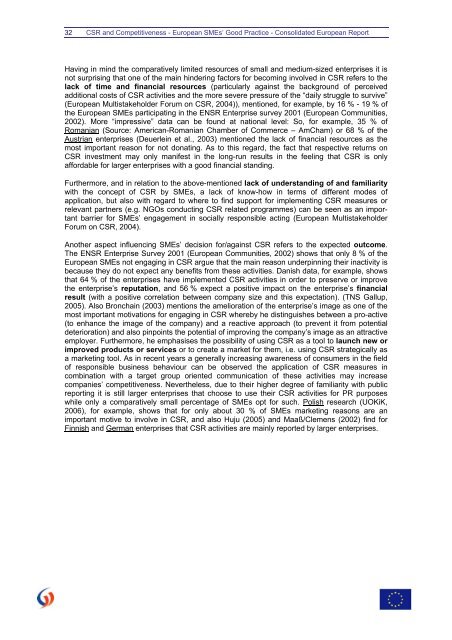CSR and Competitiveness European SMEs - KMU Forschung Austria
CSR and Competitiveness European SMEs - KMU Forschung Austria
CSR and Competitiveness European SMEs - KMU Forschung Austria
Create successful ePaper yourself
Turn your PDF publications into a flip-book with our unique Google optimized e-Paper software.
32 <strong>CSR</strong> <strong>and</strong> <strong>Competitiveness</strong> - <strong>European</strong> <strong>SMEs</strong>’ Good Practice - Consolidated <strong>European</strong> Report<br />
Having in mind the comparatively limited resources of small <strong>and</strong> medium-sized enterprises it is<br />
not surprising that one of the main hindering factors for becoming involved in <strong>CSR</strong> refers to the<br />
lack of time <strong>and</strong> financial resources (particularly against the background of perceived<br />
additional costs of <strong>CSR</strong> activities <strong>and</strong> the more severe pressure of the “daily struggle to survive”<br />
(<strong>European</strong> Multistakeholder Forum on <strong>CSR</strong>, 2004)), mentioned, for example, by 16 % - 19 % of<br />
the <strong>European</strong> <strong>SMEs</strong> participating in the ENSR Enterprise survey 2001 (<strong>European</strong> Communities,<br />
2002). More “impressive” data can be found at national level: So, for example, 35 % of<br />
Romanian (Source: American-Romanian Chamber of Commerce – AmCham) or 68 % of the<br />
<strong>Austria</strong>n enterprises (Deuerlein et al., 2003) mentioned the lack of financial resources as the<br />
most important reason for not donating. As to this regard, the fact that respective returns on<br />
<strong>CSR</strong> investment may only manifest in the long-run results in the feeling that <strong>CSR</strong> is only<br />
affordable for larger enterprises with a good financial st<strong>and</strong>ing.<br />
Furthermore, <strong>and</strong> in relation to the above-mentioned lack of underst<strong>and</strong>ing of <strong>and</strong> familiarity<br />
with the concept of <strong>CSR</strong> by <strong>SMEs</strong>, a lack of know-how in terms of different modes of<br />
application, but also with regard to where to find support for implementing <strong>CSR</strong> measures or<br />
relevant partners (e.g. NGOs conducting <strong>CSR</strong> related programmes) can be seen as an important<br />
barrier for <strong>SMEs</strong>’ engagement in socially responsible acting (<strong>European</strong> Multistakeholder<br />
Forum on <strong>CSR</strong>, 2004).<br />
Another aspect influencing <strong>SMEs</strong>’ decision for/against <strong>CSR</strong> refers to the expected outcome.<br />
The ENSR Enterprise Survey 2001 (<strong>European</strong> Communities, 2002) shows that only 8 % of the<br />
<strong>European</strong> <strong>SMEs</strong> not engaging in <strong>CSR</strong> argue that the main reason underpinning their inactivity is<br />
because they do not expect any benefits from these activities. Danish data, for example, shows<br />
that 64 % of the enterprises have implemented <strong>CSR</strong> activities in order to preserve or improve<br />
the enterprise’s reputation, <strong>and</strong> 56 % expect a positive impact on the enterprise’s financial<br />
result (with a positive correlation between company size <strong>and</strong> this expectation). (TNS Gallup,<br />
2005). Also Bronchain (2003) mentions the amelioration of the enterprise’s image as one of the<br />
most important motivations for engaging in <strong>CSR</strong> whereby he distinguishes between a pro-active<br />
(to enhance the image of the company) <strong>and</strong> a reactive approach (to prevent it from potential<br />
deterioration) <strong>and</strong> also pinpoints the potential of improving the company’s image as an attractive<br />
employer. Furthermore, he emphasises the possibility of using <strong>CSR</strong> as a tool to launch new or<br />
improved products or services or to create a market for them, i.e. using <strong>CSR</strong> strategically as<br />
a marketing tool. As in recent years a generally increasing awareness of consumers in the field<br />
of responsible business behaviour can be observed the application of <strong>CSR</strong> measures in<br />
combination with a target group oriented communication of these activities may increase<br />
companies’ competitiveness. Nevertheless, due to their higher degree of familiarity with public<br />
reporting it is still larger enterprises that choose to use their <strong>CSR</strong> activities for PR purposes<br />
while only a comparatively small percentage of <strong>SMEs</strong> opt for such. Polish research (UOKiK,<br />
2006), for example, shows that for only about 30 % of <strong>SMEs</strong> marketing reasons are an<br />
important motive to involve in <strong>CSR</strong>, <strong>and</strong> also Huju (2005) <strong>and</strong> Maaß/Clemens (2002) find for<br />
Finnish <strong>and</strong> German enterprises that <strong>CSR</strong> activities are mainly reported by larger enterprises.




